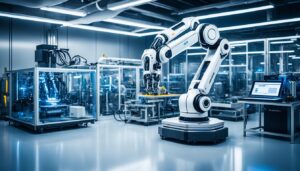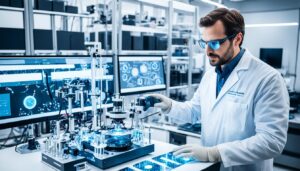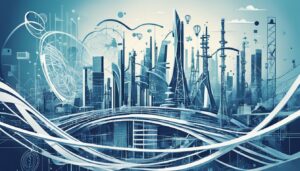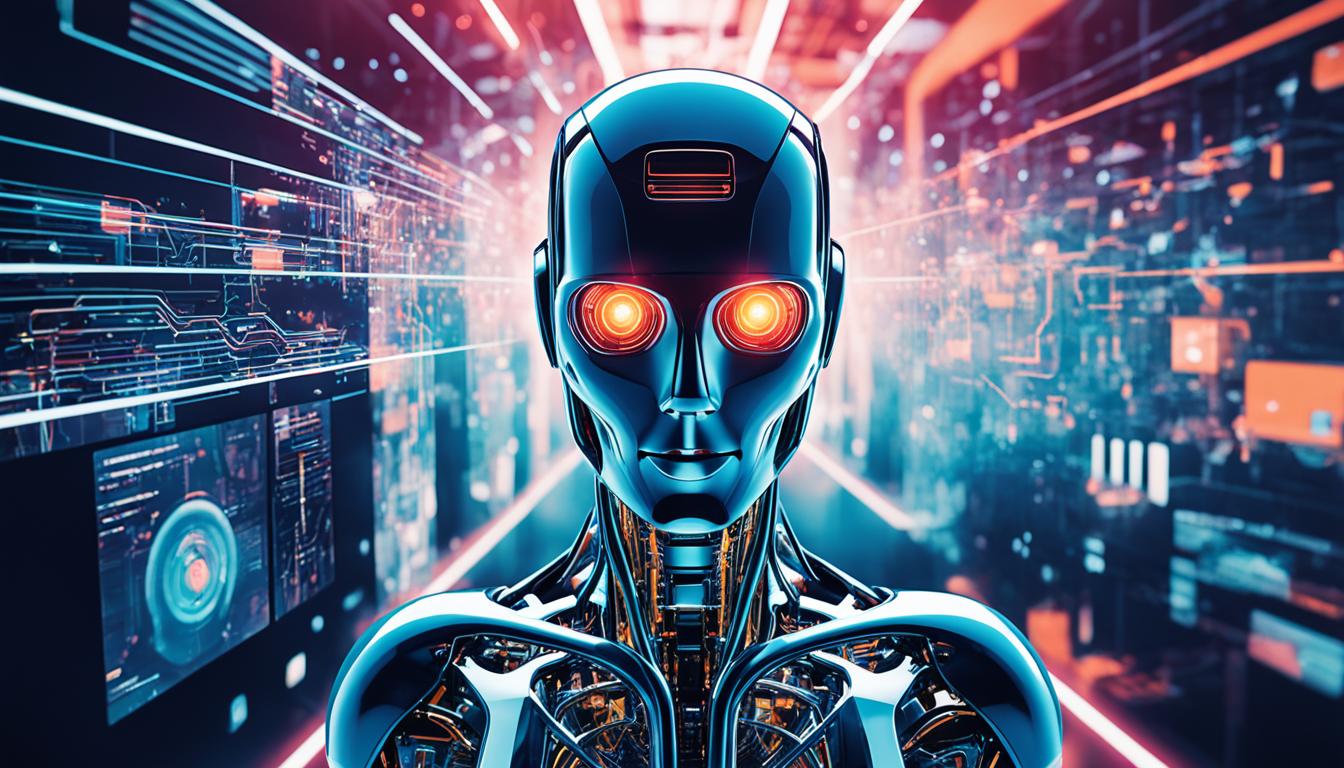
Artificial intelligence (AI) is changing everything around us. It’s making industries better, helping us make smarter decisions, and keeping our values safe. Even if many don’t know much about it, AI can change key areas like finance, national security, and health.
By tackling issues like getting to data, fixing bias in algorithms, ethics, and laws, we can make the most of AI. This way, its impact on our world will be positive.
Key Takeaways:
- AI is a powerful tool that is already transforming industries and improving decision making.
- Issues such as data access, algorithmic bias, ethics, and regulation must be addressed to maximize the benefits of AI.
- AI is being integrated into diverse sectors including finance, national security, healthcare, transportation, and smart cities.
- Job disruption, data privacy, increased regulation, and climate change are among the considerations for the future of work and society with AI.
- It is important to carefully navigate the risks and benefits of AI to ensure a positive impact on society.
AI’s Impact Across Diverse Sectors
Artificial intelligence (AI) is changing many sectors. It is revolutionizing industries and creating new chances for growth. We’ll see how AI is transforming areas like finance, security, healthcare, transportation, and smart cities.
Finance
AI plays a big role in finance, especially in making decisions, detecting fraud, and creating personal investment strategies. Financial institutions use AI to analyze data, spot risks, and improve investments.
National Security
In national security, AI helps analyze data and monitor videos. AI systems process a lot of information to find anomalies and possible threats. This makes it easier to protect the country and its people.
Healthcare
The healthcare sector gains a lot from AI. AI helps in identifying diseases, finding new drugs, and monitoring patients. This leads to early disease detection and better treatments. AI also speeds up the discovery of new medicines.
Transportation
AI is changing transportation by helping develop semi-autonomous vehicles. This improves safety and efficiency. AI also helps manage traffic to reduce congestion. Commutes become easier and more dependable.
Smart Cities
Smart cities use AI for managing infrastructure. AI helps monitor systems like transportation and waste management. This optimizes resources, reduces environmental impact, and improves residents’ lives.
Economic Development
AI boosts economic development across various sectors. The growth of AI could add trillions to the global GDP. China leads in AI investment, aiming for AI-driven economic growth.
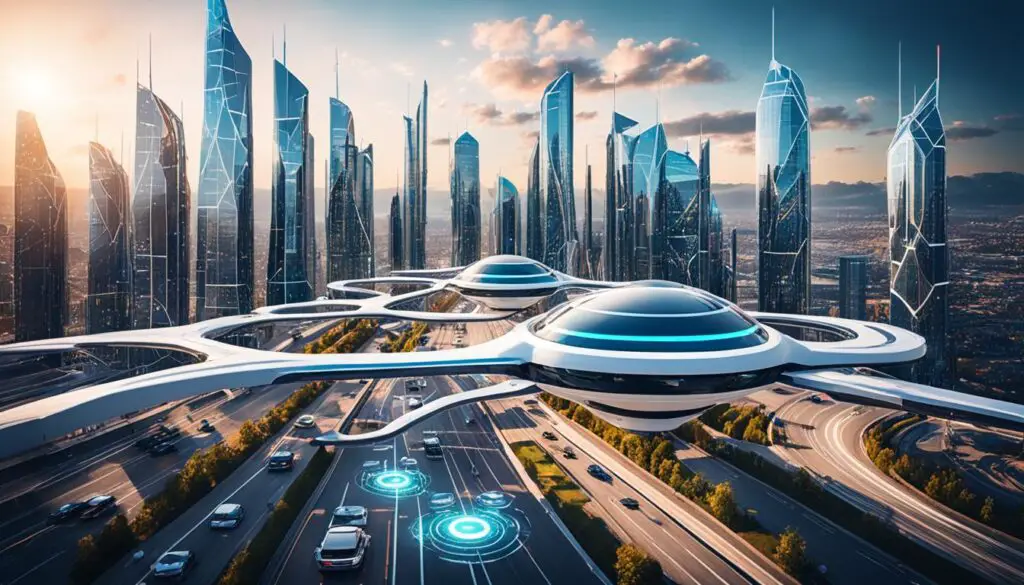
AI in finance, security, healthcare, and more brings huge benefits and opportunities. Companies and governments should use these opportunities for growth. As AI improves, its impact will shape a smarter, richer future.
The Future of Work and Society with AI
The rise of AI has changed work and society a lot. It brings excitement and also worries. Many fear job losses because AI can automate some tasks. But, AI also means people can learn new skills and find new jobs.
AI is important in business automation. Companies use AI to make work faster, better, and more productive. This helps people focus on tasks that need creativity and strategy. It helps companies grow and innovate.
AI does more than change jobs. It also raises big questions about keeping data safe and making new rules. Since AI uses much personal information, we must protect this data. So, governments and groups worldwide are making strict rules to keep data safe and privacy intact.
We also need to deal with AI’s ethical problems, like its AI models being biased. We must make rules that are fair and clear. This makes sure AI works for everyone’s good, not causing harm or unfairness. It builds trust in AI technology.
AI can also help fight climate change. It can look at environmental data, use energy better, and find green solutions. By using AI wisely, we can make our world more sustainable.
Different fields are already feeling AI’s big impact. Manufacturing, healthcare, and transportation are changing with AI. For example, factories are getting smarter, doctors use AI to treat patients better, and cars can drive themselves. These changes are big for how we live and work.
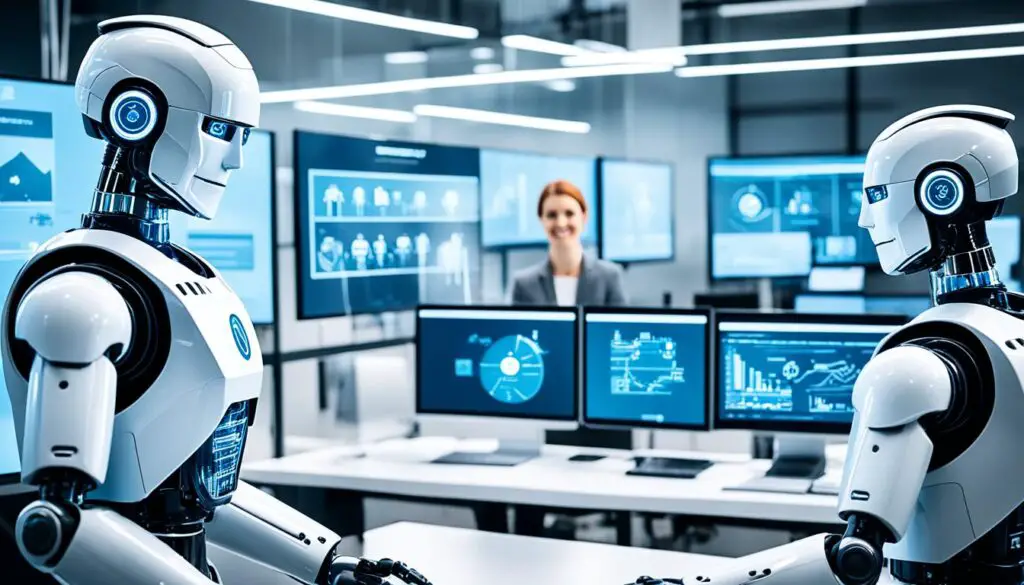
As AI keeps growing, we must be careful with its risks and benefits. It’s important to balance automation with creating jobs. We also need to ensure data privacy and make ethical rules. This way, AI improves our society fully.
The Future of Work and Society with AI in Summary:
- AI’s impact on work includes both automation and the creation of new roles
- Data privacy and increased regulation are crucial considerations in the age of AI
- Ethical issues surrounding AI models prompt the need for stricter regulations
- AI has the potential to contribute to sustainability efforts and tackle climate change
- Various industries are already experiencing the transformative effects of AI
As AI becomes a bigger part of work and society, we must use its opportunities well. We must solve any problems it brings. This way, AI will have a positive effect on our jobs, our lives, and our world.
Conclusion
The power of artificial intelligence (AI) is clear and wide-reaching. It’s changing industries and helping us make better decisions. To really benefit from AI and protect our values, we must tackle issues. These include data availability, biases in algorithms, ethics, and rules.
AI is making big changes in many areas. In finance, it helps with making choices and spotting fraud. In national defense, it improves how we analyze data and watch over things. In healthcare, AI is used to find diseases and develop new medicines. It’s also making our cities smarter and our transport systems more efficient. These uses could add a lot of value to the world economy.
AI’s impact on work and society comes with good and bad points. Job changes are likely, but AI also offers new job options and ways to learn more skills. As AI grows, keeping data safe and setting strict rules are key. We need solid ethical guidelines to fight bias and use AI responsibly. AI can also help us deal with big issues like climate change.
Navigating AI’s effects means balancing the good with the bad to make sure it helps society. We can do this by making more data available, funding research, keeping human control, and encouraging good ethics. If we can support AI’s growth while keeping our moral compass, we’ll create a future led by smart technology and kindness.
FAQ
How is artificial intelligence (AI) impacting different industries?
What are the potential benefits of AI?
What are the concerns associated with AI?
How can AI be used to benefit society?
Source Links
- https://www.brookings.edu/articles/how-artificial-intelligence-is-transforming-the-world/
- https://builtin.com/artificial-intelligence/artificial-intelligence-future
- https://www.forbes.com/sites/marenbannon/2023/06/22/how-ai-is-changing-the-future-of-work/

